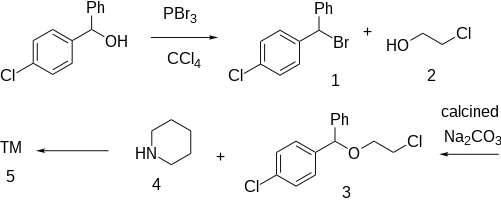Chemical compound
Pharmaceutical compound
Cloperastine (INN ) or cloperastin , in the forms of cloperastine hydrochloride (JAN ) (brand names Hustazol , Nitossil , Seki ) and cloperastine fendizoate , is an antitussive and antihistamine that is marketed as a cough suppressant in Japan , Hong Kong , and in some European countries.[ 1] [ 2] [ 3] Italy in 1981.[ 4]
Side effects
Adverse effects may include sedation, drowsiness, heartburn, and thickening of bronchial secretions.[ 5]
Pharmacology
The precise mechanism of action of cloperastine is not fully clear, but several different biological activities have been identified for the drug, of which include: ligand of the σ1 receptor (Ki = 20 nM) (likely an agonist ),[ 6] GIRK channel blocker (described as "potent"),[ 7] [ 8] [ 9] [ 10] antihistamine (Ki = 3.8 nM for the H1 receptor ),[ 3] [ 6] anticholinergic .[ 3] [ 11] side effects , such as sedation and somnolence , while the former two may be involved in or responsible for the antitussive efficacy of cloperastine.[ 6] [ 7]
Synthesis
Synthesis:[ 12] [ 13] [ 14] [ 15] [ 16] The halogenation of 4-Chlorobenzhydrol [119-56-2] (1 ) with phosphorus tribromide in tetrachloromethane gives 1-(Bromophenylmethyl)-4-chlorobenzene [948-54-9] (2 ). Treatment with ethylenechlorohydrin (2-Chloroethanol ) [107-07-3] (3 ) gives 1-(4-Chlorobenzhydryl)oxy-2-chloroethane [5321-46-0] (4 ). Reaction with piperidine (5 ) completes the synthesis of Cloperastine (6 ).
See also
References
^ Elks J (14 November 2014). The Dictionary of Drugs: Chemical Data: Chemical Data, Structures and Bibliographies ISBN 978-1-4757-2085-3 ^ Swiss Pharmaceutial Society, ed. (January 2000). Index Nominum 2000: International Drug Directory ISBN 978-3-88763-075-1 ^ a b c Catania MA, Cuzzocrea S (2011). "Pharmacological and clinical overview of cloperastine in treatment of cough" . Therapeutics and Clinical Risk Management . 7 : 83–92. doi :10.2147/TCRM.S16643 PMC 3061847 PMID 21445282 . ^ William Andrew Publishing (22 October 2013). Pharmaceutical Manufacturing Encyclopedia ISBN 978-0-8155-1856-3 ^ Schlesser JL (1991). Drugs Available Abroad, 1st Edition . Derwent Publications Ltd. p. 29. ISBN 0-8103-7177-4 ^ a b c Gregori-Puigjané E, Setola V, Hert J, Crews BA, Irwin JJ, Lounkine E, et al. (July 2012). "Identifying mechanism-of-action targets for drugs and probes" . Proceedings of the National Academy of Sciences of the United States of America . 109 (28): 11178–83. Bibcode :2012PNAS..10911178G . doi :10.1073/pnas.1204524109 PMC 3396511 PMID 22711801 . ^ a b Chung KF, Widdicombe J (30 September 2008). Pharmacology and Therapeutics of Cough ISBN 9783540798422 ^ Soeda F, Fujieda Y, Kinoshita M, Shirasaki T, Takahama K (May 2016). "Centrally acting non-narcotic antitussives prevent hyperactivity in mice: Involvement of GIRK channels". Pharmacology, Biochemistry, and Behavior . 144 : 26–32. doi :10.1016/j.pbb.2016.02.006 . ISBN 978-3-540-79842-2 OCLC 612742272 . PMID 26892760 . S2CID 30118634 . ^ Yamamoto G, Soeda F, Shirasaki T, Takahama K (April 2011). "[Is the GIRK channel a possible target in the development of a novel therapeutic drug of urinary disturbance?]" . Yakugaku Zasshi . 131 (4): 523–32. doi :10.1248/yakushi.131.523 PMID 21467791 . ^ Kawaura K, Honda S, Soeda F, Shirasaki T, Takahama K (May 2010). "[Novel antidepressant-like action of drugs possessing GIRK channel blocking action in rats]" . Yakugaku Zasshi . 130 (5): 699–705. doi :10.1248/yakushi.130.699 PMID 20460867 . ^ Korolkovas A (16 August 1988). Essentials of Medicinal Chemistry ISBN 978-0-471-88356-2 ^ Arnold H, Brock N, Kuhas E, Lorenz D (March 1954). "[Effect of antihistaminic substances. I. Chemical constitution and pharmacological effect of the basic benzhydrylethers]". Arzneimittel-Forschung . 4 (3): 189–194. PMID 13159698 . ^ Anon., GB 1179945
^ Anon., GB 670622
^ Laura Puricelli, EP 0894794
^ 陶文潘, 潘文驰, 潘兴长, 罗泳萍, 樊希祥, CN 104327014A
H1
Agonists Antagonists
Others: Atypical antipsychotics (e.g., aripiprazole , asenapine , brexpiprazole , brilaroxazine , clozapine , iloperidone , olanzapine , paliperidone , quetiapine , risperidone , ziprasidone , zotepine )Phenylpiperazine antidepressants (e.g., hydroxynefazodone , nefazodone , trazodone , triazoledione )Tetracyclic antidepressants (e.g., amoxapine , loxapine , maprotiline , mianserin , mirtazapine , oxaprotiline )Tricyclic antidepressants (e.g., amitriptyline , butriptyline , clomipramine , desipramine , dosulepin (dothiepin) , doxepin , imipramine , iprindole , lofepramine , nortriptyline , protriptyline , trimipramine )Typical antipsychotics (e.g., chlorpromazine , flupenthixol , fluphenazine , loxapine , perphenazine , prochlorperazine , thioridazine , thiothixene )
H2
H3
H4
Calcium
VDCCs Tooltip Voltage-dependent calcium channels
Potassium
VGKCs Tooltip Voltage-gated potassium channels
IRKs Tooltip Inwardly rectifying potassium channel
KCa Tooltip Calcium-activated potassium channel
K2Ps Tooltip Tandem pore domain potassium channel
Sodium
VGSCs Tooltip Voltage-gated sodium channels
ENaC Tooltip Epithelial sodium channel
ASICs Tooltip Acid-sensing ion channel
Chloride
CaCCs Tooltip Calcium-activated chloride channel
CFTR Tooltip Cystic fibrosis transmembrane conductance regulator
Unsorted
Others
TRPs Tooltip Transient receptor potential channels LGICs Tooltip Ligand gated ion channels
mAChRs Tooltip Muscarinic acetylcholine receptors
Agonists Antagonists
3-Quinuclidinyl benzilate 4-DAMP Aclidinium bromide (+formoterol )Abediterol AF-DX 250 AF-DX 384 Ambutonium bromide Anisodamine Anisodine Antihistamines (first-generation) (e.g., brompheniramine , buclizine , captodiame , chlorphenamine (chlorpheniramine) , cinnarizine , clemastine , cyproheptadine , dimenhydrinate , dimetindene , diphenhydramine , doxylamine , meclizine , mequitazine , perlapine , phenindamine , pheniramine , phenyltoloxamine , promethazine , propiomazine , triprolidine )AQ-RA 741 Atropine Atropine methonitrate Atypical antipsychotics (e.g., clozapine , fluperlapine , olanzapine (+fluoxetine ), rilapine , quetiapine , tenilapine , zotepine )Benactyzine Benzatropine (benztropine) Benzilone Benzilylcholine mustard Benzydamine Bevonium BIBN 99 Biperiden Bornaprine Camylofin CAR-226,086 CAR-301,060 CAR-302,196 CAR-302,282 CAR-302,368 CAR-302,537 CAR-302,668 Caramiphen Cimetropium bromide Clidinium bromide Cloperastine CS-27349 Cyclobenzaprine Cyclopentolate Darifenacin DAU-5884 Desfesoterodine Dexetimide DIBD Dicycloverine (dicyclomine) Dihexyverine Difemerine Diphemanil metilsulfate Ditran Drofenine EA-3167 EA-3443 EA-3580 EA-3834 Emepronium bromide Etanautine Etybenzatropine (ethybenztropine) Fenpiverinium Fentonium bromide Fesoterodine Flavoxate Glycopyrronium bromide (+beclometasone/formoterol , +indacaterol , +neostigmine )Hexahydrodifenidol Hexahydrosiladifenidol Hexbutinol Hexocyclium Himbacine HL-031,120 Homatropine Imidafenacin Ipratropium bromide (+salbutamol )Isopropamide J-104,129 Hyoscyamine Mamba toxin 3 Mamba toxin 7 Mazaticol Mebeverine Meladrazine Mepenzolate Methantheline Methoctramine Methylatropine Methylhomatropine Methylscopolamine Metixene Muscarinic toxin 7 N-Ethyl-3-piperidyl benzilate N-Methyl-3-piperidyl benzilate Nefopam Octatropine methylbromide (anisotropine methylbromide) Orphenadrine Otenzepad (AF-DX 116) Otilonium bromide Oxapium iodide Oxitropium bromide Oxybutynin Oxyphencyclimine Oxyphenonium bromide PBID PD-102,807 PD-0298029 Penthienate Pethidine pFHHSiD Phenglutarimide Phenyltoloxamine Pipenzolate bromide Piperidolate Pirenzepine Piroheptine Pizotifen Poldine Pridinol Prifinium bromide Procyclidine Profenamine (ethopropazine) Propantheline bromide Propiverine Quinidine 3-Quinuclidinyl thiochromane-4-carboxylate Revefenacin Rociverine RU-47,213 SCH-57,790 SCH-72,788 SCH-217,443 Scopolamine (hyoscine) Scopolamine butylbromide (hyoscine butylbromide) Silahexacyclium Sofpironium bromide Solifenacin SSRIs Tooltip Selective serotonin reuptake inhibitors (e.g., femoxetine , paroxetine )Telenzepine Terodiline Tetracyclic antidepressants (e.g., amoxapine , maprotiline , mianserin , mirtazapine )Tiemonium iodide Timepidium bromide Tiotropium bromide Tiquizium bromide Tofenacin Tolterodine Tricyclic antidepressants (e.g., amitriptyline (+perphenazine ), amitriptylinoxide , butriptyline , cidoxepin , clomipramine , desipramine , desmethyldesipramine , dibenzepin , dosulepin (dothiepin) , doxepin , imipramine , lofepramine , nitroxazepine , northiaden (desmethyldosulepin) , nortriptyline , protriptyline , quinupramine , trimipramine )Tridihexethyl Trihexyphenidyl Trimebutine Tripitamine (tripitramine) Tropacine Tropatepine Tropicamide Trospium chloride Typical antipsychotics (e.g., chlorpromazine , chlorprothixene , cyamemazine (cyamepromazine) , loxapine , mesoridazine , thioridazine )Umeclidinium bromide (+vilanterol )WIN-2299 Xanomeline Zamifenacin
Precursors (and prodrugs )

